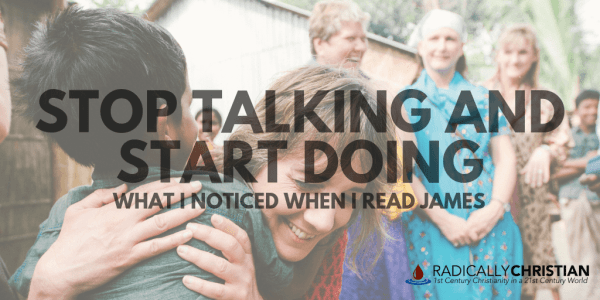Stop Talking and Start Doing: What I Noticed When I Read James
The book of James might be one of the easiest books for Christians to understand, regardless of time and culture. It deals with the sort of issues and behaviors that are common to religious people of every era, and there is really no misunderstanding what James is telling his audience to do and not to do. I always end up feeling incredibly convicted by this short little book.

The Audience
James simply addresses this book to, “the twelve tribes in the Dispersion.” This could mean he is writing to Jewish Christians, or he could be referring to all Christians as part of the new Israel. The book doesn’t seem to be a letter intended for a specific church. In fact, it doesn’t really seem to be a letter at all, because there is no formal greeting in the beginning or the end.
James seems to be writing to the kind of Christians who think very highly of themselves; the kind of people who consider themselves to be wise, religious, and capable teachers. They are critical and judgmental. They want to live comfortable lives. They envy wealth and scorn poverty. They believe themselves to have a lot of faith and a lot of wisdom, but what they really have is a lot of words.
Be Quiet and Listen
It’s interesting to me how often James’ words, “Be quick to hear, slow to speak, slow to anger” are taken out of context. People typically quote these words as a strategy for interpersonal relationships. They say things like, “God gave us two ears and one mouth, so we should always do twice as much listening as we do talking.” Certainly, it’s good advice to listen more than you talk, but James has a specific kind of listening in mind.
In the same context, James writes, “put away all filthiness and rampant wickedness and receive with meekness the implanted word, which is able to save your souls.” Too often, when someone is trying to share a word which is able to save our souls, we get angry and defensive. James tells his audience to “receive with meekness the implanted word.” It is almost always a good idea to be quiet and listen, but especially when someone is trying to correct our “filthiness” and “wickedness.”
How often do we get defensive when someone shares the word of truth with us? How often do we get angry at those who are trying to help us? How often do we say, “I disagree,” when we ought to say, “You might be right, let me think about that”?
Faith, Religion, and Wisdom Can Be Seen
James touches on various issues throughout this short book, but they all seem to revolve around the idea that it is not enough to say we are religious people, people of faith, or people with wisdom. We must prove our faith, religion, and wisdom by what we do. Words do not prove what is in our hearts, action proves what is in our hearts.
James tells his audience to “be doers of the word, and not hearers only.” He tells them that real religion is about helping widows and orphans. He tells them faith without works is as useless as wishing someone well who has no clothes or food.
To those who think they are wise, James says that their “bitter jealousy and selfish ambition” prove their wisdom is “earthly, unspiritual, demonic.” Real wisdom isn’t about the ability to conjure up the right words to put opponents in their place. Real wisdom is proven by good conduct and meekness. Real wisdom, wisdom from God, is:
pure
peaceable
gentle
open to reason
full of mercy
full of good fruits
impartial
sincere
In all of these areas, James invites his readers to prove they are wise, religious, and faithful by living lives of humble and loving service to others.
Poverty and Suffering
Like his brother Jesus, James warns about the dangers of comfort and wealth. He encourages his audience to be content with poverty and trials. The book begins by encouraging people to, “Count it all joy,” when they, “meet trials of various kinds.” He promises that patiently enduring trials will result in being, “perfect and complete, lacking in nothing.”
He warns them not to give preference to rich people, above poor people, who visit their assemblies. He implies that riches do not make someone admirable, reminding that the rich are the ones who “oppress you,” the ones who “drag you into court,” and the ones who “blaspheme the honorable name by which you were called.”
James includes one of the strongest warnings and condemnations of those who live their lives in self-indulgence, taking advantage of others:
Come now, you rich, weep and howl for the miseries that are coming upon you. Your riches have rotted and your garments are moth-eaten. Your gold and silver have corroded, and their corrosion will be evidence against you and will eat your flesh like fire. You have laid up treasure in the last days. Behold, the wages of the laborers who mowed your fields, which you kept back by fraud, are crying out against you, and the cries of the harvesters have reached the ears of the Lord of hosts. You have lived on the earth in luxury and in self-indulgence. You have fattened your hearts in a day of slaughter. You have condemned and murdered the righteous person. He does not resist you
James closes the book by encouraging his readers to think of themselves as farmers. As farmers wait patiently for the harvest, Christians wait patiently, “for the coming of the Lord.” We live our lives not based on what we can see, but in confident expectation about what is to come.
I love you and God loves you,
Wes McAdams
The post Stop Talking and Start Doing: What I Noticed When I Read James appeared first on Radically Christian.


